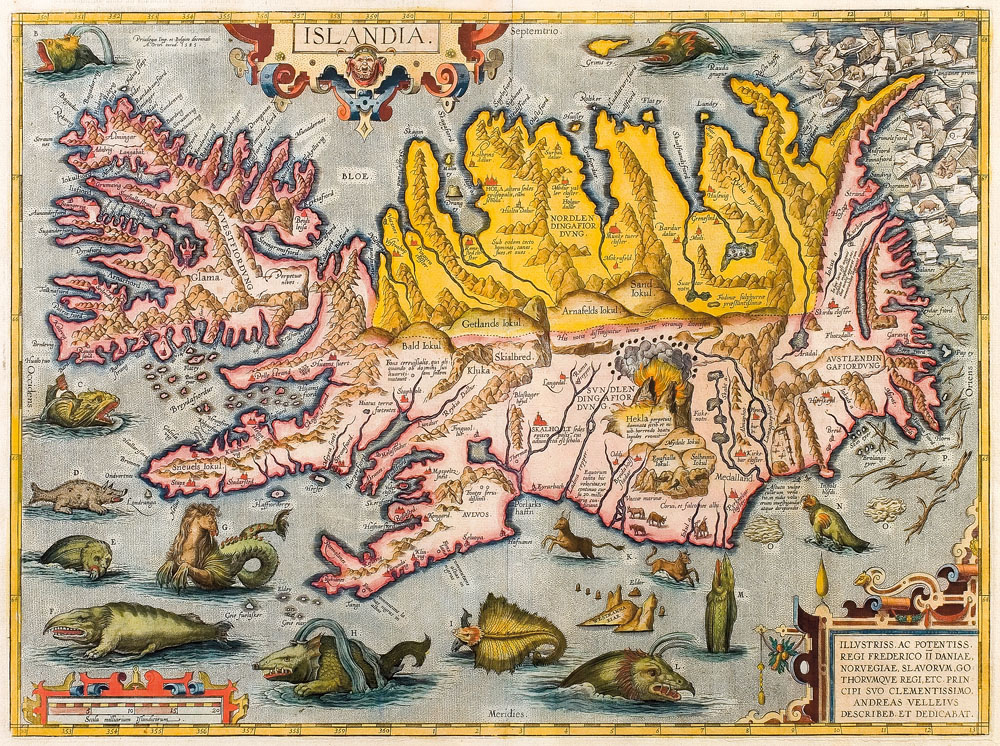【A Married Woman Next Door Who Raises Three Waters (2019)】
Old Maps
Our Daily Correspondent

Islandia, a map by Abraham Ortelius, ca. 1590.
Many years ago, on a family vacation in another country, we took an English-language tour of a medieval university. The group saw the antique telescopes and charts used by famous astronomers, and the stone-floored laboratories where philosophers had tried to turn lead into gold. And there was a room filled with maps—sixteenth-century maps, we were told. These were objects of beauty, filled with colors and sea monsters, fanciful by modern standards.
The earnest young guide pointed out the map’s many inaccuracies. India was mere steps from Greenland; oceans shrank and distended themselves seemingly on a whim; North America was the size of a pea. Everyone laughed and crowded closer to point out the mistakes, shaking our heads at the folly of earlier people. How little they knew about themselves in relationship to the world!
Why did it make me so angry? I’m sure none of these museumgoers was smug and jeering—and what if they had been? The cartographer had been in his grave for centuries. And yet I was furious: it seemed to me the height of arrogance to mock people for not knowing what we do now. How much do we take on faith today? Living five hundred years ago, I would surely have trusted the scholars who made these maps, who wrested some idea of the world from others who had sailed for weeks and months and kept charts with all the precision they could muster. Hell, if asked now, I probably couldn’t draw a map as accurate as this one.
I wish I could say I was thinking something grander—about colonialism, maybe, or shortsighted global arrogance. But I wasn’t, I don’t think. This was around the age when I self-described as a deist and exclusively wore 1940s-era housedresses. I was probably just mad: angry at older people, at the world, at my family, and obscurely humiliated by my role in the human race.
Now I think that maybe my anger wasn’t completely unjustified. But that, in a sense, the smug, modern superiority that so enraged me was “progress”—the most literal form of it.
Sadie Stein is contributing editor of The Paris Review, and the Daily’s correspondent.
Search
Categories
Latest Posts
Musetti vs. Diallo 2025 livestream: Watch Madrid Open for free
2025-06-26 10:45Review: The VitaJuwel crystal water bottle was mostly just heavy
2025-06-26 09:58René Auberjonois, Odo from 'Star Trek: Deep Space Nine', has died
2025-06-26 08:48Google Pixel Buds Pro 2: $40 off at Amazon
2025-06-26 08:01Popular Posts
Robin Triumphant
2025-06-26 10:44Head and neck injuries from cell phone use are rising, study finds
2025-06-26 10:37Apple iPhone 17 Pro leaks highlight major new design change
2025-06-26 08:43Featured Posts
Things Intel Needs to Fix
2025-06-26 10:29Head and neck injuries from cell phone use are rising, study finds
2025-06-26 10:09The 10 best films of 2019, from 'Avengers: Endgame' to 'Parasite'
2025-06-26 09:21Popular Articles
NYT Strands hints, answers for May 2
2025-06-26 10:33Sprint contractor leaks 261,000 phone bills and bank statements
2025-06-26 09:08Hurricane Laura's impact lingered with nightmarish mosquito swarms
2025-06-26 08:58Newsletter
Subscribe to our newsletter for the latest updates.
Comments (367)
Creation Information Network
Anker raises Amazon prices amid US tariffs
2025-06-26 10:43Speed Information Network
'The Mandalorian' Chapter 5 explores familiar territory on Tatooine
2025-06-26 09:19Star Information Network
Emma Watson's book fairies are hiding feminist books all over the world
2025-06-26 08:19Star Sky Information Network
Snapchat Cameo is like a less scary deepfake for your Snaps
2025-06-26 08:06Time Information Network
No Time for a Negative Peace
2025-06-26 08:05